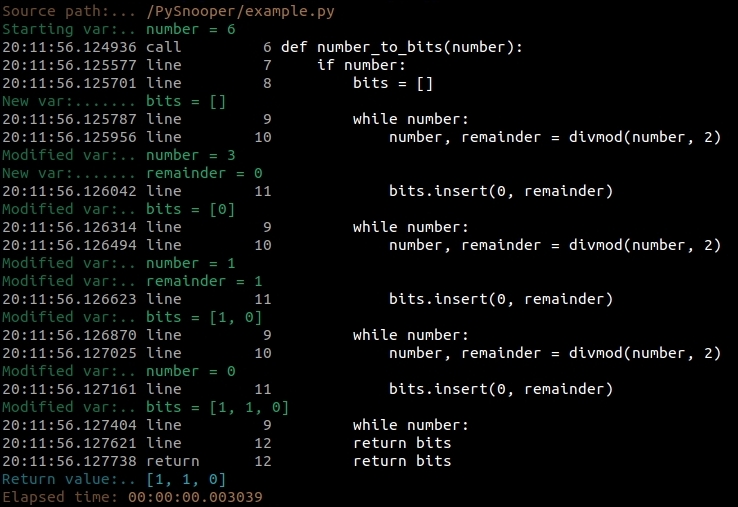A poor man's debugger for Python.
Project description
PySnooper - Never use print for debugging again
PySnooper is a poor man's debugger. If you've used Bash, it's like set -x for Python, except it's fancier.
Your story: You're trying to figure out why your Python code isn't doing what you think it should be doing. You'd love to use a full-fledged debugger with breakpoints and watches, but you can't be bothered to set one up right now.
You want to know which lines are running and which aren't, and what the values of the local variables are.
Most people would use print lines, in strategic locations, some of them showing the values of variables.
PySnooper lets you do the same, except instead of carefully crafting the right print lines, you just add one decorator line to the function you're interested in. You'll get a play-by-play log of your function, including which lines ran and when, and exactly when local variables were changed.
What makes PySnooper stand out from all other code intelligence tools? You can use it in your shitty, sprawling enterprise codebase without having to do any setup. Just slap the decorator on, as shown below, and redirect the output to a dedicated log file by specifying its path as the first argument.
Example
We're writing a function that converts a number to binary, by returning a list of bits. Let's snoop on it by adding the @pysnooper.snoop() decorator:
import pysnooper
@pysnooper.snoop()
def number_to_bits(number):
if number:
bits = []
while number:
number, remainder = divmod(number, 2)
bits.insert(0, remainder)
return bits
else:
return [0]
number_to_bits(6)
The output to stderr is:
Or if you don't want to trace an entire function, you can wrap the relevant part in a with block:
import pysnooper
import random
def foo():
lst = []
for i in range(10):
lst.append(random.randrange(1, 1000))
with pysnooper.snoop():
lower = min(lst)
upper = max(lst)
mid = (lower + upper) / 2
print(lower, mid, upper)
foo()
which outputs something like:
New var:....... i = 9
New var:....... lst = [681, 267, 74, 832, 284, 678, ...]
09:37:35.881721 line 10 lower = min(lst)
New var:....... lower = 74
09:37:35.882137 line 11 upper = max(lst)
New var:....... upper = 832
09:37:35.882304 line 12 mid = (lower + upper) / 2
74 453.0 832
New var:....... mid = 453.0
09:37:35.882486 line 13 print(lower, mid, upper)
Elapsed time: 00:00:00.000344
Features
If stderr is not easily accessible for you, you can redirect the output to a file:
@pysnooper.snoop('/my/log/file.log')
You can also pass a stream or a callable instead, and they'll be used.
See values of some expressions that aren't local variables:
@pysnooper.snoop(watch=('foo.bar', 'self.x["whatever"]'))
Show snoop lines for functions that your function calls:
@pysnooper.snoop(depth=2)
See Advanced Usage for more options. <------
Installation with Pip
The best way to install PySnooper is with Pip:
$ pip install pysnooper
Other installation options
Conda with conda-forge channel:
$ conda install -c conda-forge pysnooper
Arch Linux:
$ yay -S python-pysnooper
Fedora Linux:
$ dnf install python3-pysnooper
Citing PySnooper
If you use PySnooper in academic work, please use this citation format:
@software{rachum2019pysnooper,
title={PySnooper: Never use print for debugging again},
author={Rachum, Ram and Hall, Alex and Yanokura, Iori and others},
year={2019},
month={jun},
publisher={PyCon Israel},
doi={10.5281/zenodo.10462459},
url={https://github.com/cool-RR/PySnooper}
}
License
Copyright (c) 2019 Ram Rachum and collaborators, released under the MIT license.
Media Coverage
Hacker News thread and /r/Python Reddit thread (22 April 2019)
Project details
Release history Release notifications | RSS feed
Download files
Download the file for your platform. If you're not sure which to choose, learn more about installing packages.
Source Distribution
Built Distribution
Filter files by name, interpreter, ABI, and platform.
If you're not sure about the file name format, learn more about wheel file names.
Copy a direct link to the current filters
File details
Details for the file pysnooper-1.2.3.tar.gz.
File metadata
- Download URL: pysnooper-1.2.3.tar.gz
- Upload date:
- Size: 46.3 kB
- Tags: Source
- Uploaded using Trusted Publishing? No
- Uploaded via: twine/6.0.1 CPython/3.13.1
File hashes
| Algorithm | Hash digest | |
|---|---|---|
| SHA256 |
1fa1425444a7af45108aaed860b5ca8b62b25bba25b0b037c059ba353d8f1e74
|
|
| MD5 |
a4278138a6f45384a538d66fe83783c5
|
|
| BLAKE2b-256 |
d24abe3c144f58de6b78911c417cc4a3b3fe5eb6d13cae4c12daf3ca17a8d473
|
File details
Details for the file PySnooper-1.2.3-py2.py3-none-any.whl.
File metadata
- Download URL: PySnooper-1.2.3-py2.py3-none-any.whl
- Upload date:
- Size: 15.1 kB
- Tags: Python 2, Python 3
- Uploaded using Trusted Publishing? No
- Uploaded via: twine/6.0.1 CPython/3.13.1
File hashes
| Algorithm | Hash digest | |
|---|---|---|
| SHA256 |
546372f0e72da89f8d1b89e758b7c05a478d65288569a1ca2cc1620e7b1b1944
|
|
| MD5 |
df686e0b9fcd7bce37b4753f2b58665f
|
|
| BLAKE2b-256 |
6987df62c8a998216e6749b67d548dae0967906036c61457510ef49667927c49
|












